UN supported programmes integrate prevention of sexual exploitation and abuse

The United Nations, with funding from the Embassy of Ireland, has rolled out the PSEA Project across all ten provinces of Zimbabwe
The United Nations in Zimbabwe conducted an awareness campaign on Prevention of Sexual Exploitation and Abuse (PSEA) in Highfields and Hopley targeting communities who have been receiving relief and development assistance from various UN entities.
The campaign, which took place on 14 October 2022 brought together experts from UNRCO, UNOPS, GOAL, and Musasa, is part of an ongoing nation-wide effort to promote the United Nations policy of zero tolerance to sexual exploitation and abuse (SEA) in UN supported programmes.
“The United Nations does not tolerate sexual exploitation and abuse hence it should be reported through established channels. A survivor-centered approach in handling such matters will be taken to ensure the victim is safe and that justice is served,” said the United Nations PSEA Coordinator, Lipotso `Musi.
Through implementing partners, GOAL Zimbabwe and Musasa, the PSEA awareness-raising campaigns include roadshows, jingles, skits, and media outreach to motivate communities to report SEA and appreciate that relief assistance is free for all people in need. The objective is to deconstruct negative social norms where the vulnerable are sexually exploited for money, employment, goods, or services from individuals in positions of authority.
“The project supports the critical work of Non-Governmental Organizations and UN Agencies supporting the Government of Zimbabwe by ensuring all affected people know that humanitarian assistance is never conditional,” stated Gashaw Makonnen, Country Director for GOAL in Zimbabwe.
The United Nations, with funding from the Embassy of Ireland, has rolled out the PSEA Project across all ten provinces of Zimbabwe. The project is designed to create awareness among communities on their right to protection from SEA, and in the unfortunate case, educate beneficiary communities on access to safe channels for reporting.
In Zimbabwe, disasters have escalated the need for humanitarian assistance which has also increased communities’ exposure to sexual exploitation and abuse from humanitarian workers. A consistent, long-term engagement with communities will dismantle negative social norms which perpetuate exploitation and abuse and create barriers to safe and accessible reporting of sexual exploitation and abuse perpetrated against beneficiaries.
Findings of risk assessment undertaken by the Zimbabwe PSEA Network in 2020, highlighted barriers to reporting SEA are linked to low awareness of reporting channels and fear of retaliation by the perpetrators who use their power to exploit. The PSEA project provides a platform for individuals to speak out without fear of exclusion from humanitarian assistance.



